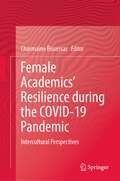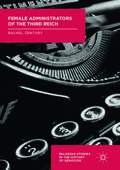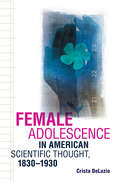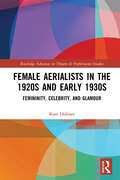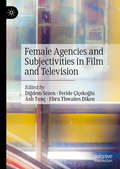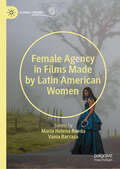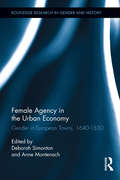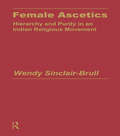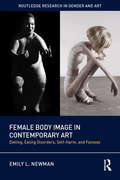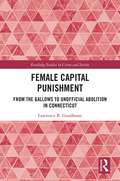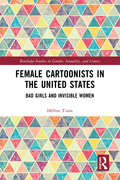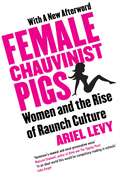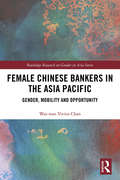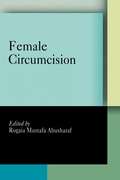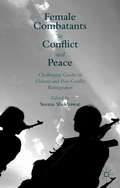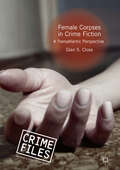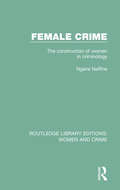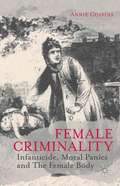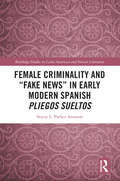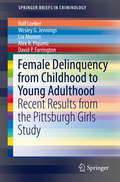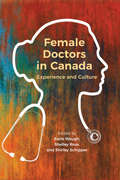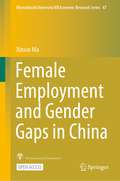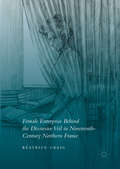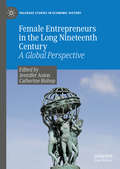- Table View
- List View
Female Academics’ Resilience during the COVID-19 Pandemic: Intercultural Perspectives
by Charmaine BissessarThis edited book encompasses themes related to resilience during the pandemic with a special focus on what female academics did to hone their resilience. It addresses issues of resilience related to mental health, care and well-being, leading, teaching, and learning. The book offers the reader a glimpse into the academics’ lived experiences and shows how they negotiated and navigated the pandemic. Each academic discusses challenges and triumphs such as wellness, leadership, work-life balance, and workplace burnout.The information contained in the book is significant to different parts of the world such as Guyana, Trinidad, Jamaica, Ireland, England, USA, US Virgin Islands, India, Tanzania, Philippines and China. The authors come from various backgrounds with experiences that add to the multi-cultural and multifaceted nature of resilience. They are leading practitioners who have been involved in face-to-face and online teaching, leading and learning for many years. The book brings with it the experience, enculturation, and wealth of knowledge which is of value to academics, researchers, and policy makers who wish to interrogate and understand the concept of resilience.
Female Administrators of the Third Reich
by Rachel CenturyThis book compares female administrators who specifically chose to serve the Nazi cause in voluntary roles with those who took on such work as a progression of established careers. Under the Nazi regime, secretaries, SS-Helferinnen (female auxiliaries for the SS) and Nachrichtenhelferinnen des Heeres (female auxiliaries for the army) held similar jobs: taking dictation, answering telephones, sending telegrams. Yet their backgrounds and degree of commitment to Nazi ideology differed markedly. The author explores their motivations and what they knew about the true nature of their work. These women had access to information about the administration of the Holocaust and are a relatively untapped resource. Their recollections shed light on the lives, love lives, and work of their superiors, and the tasks that contributed to the displacement, deportation and death of millions. The question of how gender intersected with Nazism, repression, atrocity and genocide forms the conceptual thread of this book.
Female Adolescence in American Scientific Thought, 1830–1930 (New Studies in American Intellectual and Cultural History)
by Crista DeLuzioIn this groundbreaking study, Crista DeLuzio asks how scientific experts conceptualized female adolescence in the nineteenth and early twentieth centuries. Revisiting figures like G. Stanley Hall and Margaret Mead and casting her net across the disciplines of biology, psychology, and anthropology, DeLuzio examines the process by which youthful femininity in America became a contested cultural category.Challenging accepted views that professionals "invented" adolescence during this period to understand the typical experiences of white middle-class boys, DeLuzio shows how early attempts to reconcile that conceptual category with "femininity" not only shaped the social science of young women but also forced child development experts and others to reconsider the idea of adolescence itself. DeLuzio’s provocative work permits a fuller understanding of how adolescence emerged as a "crisis" in female development and offers insight into why female adolescence remains a social and cultural preoccupation even today.
Female Aerialists in the 1920s and Early 1930s: Femininity, Celebrity, and Glamour (Routledge Advances in Theatre & Performance Studies)
by Kate HolmesFemale solo aerialists of the 1920s and early 1930s were internationally popular performers in the largest live performance mass entertainment of the period in the UK and USA. Yet these aerialists and this period in circus history have been largely forgotten despite the iconic image of ‘the’ female aerialist still flaring in the popular imagination. Kate Holmes uses insights gained as a practitioner to reconstruct in detail the British and American performances and public personae of key stars such as Lillian Leitzel, Luisita Leers, and the Flying Codonas, revealing what is performed and implicit in today’s practice. Using a wealth of original sources, this book considers the forgotten stars whose legacy of the cultural image of the female aerialist echoes. Locating performers within wider cultural histories of sport, glamour, and gender, this book asks important questions about their stardom, including: Why were female aerialists so alluring when their muscularity challenged conservative ideals of femininity and how did they participate in change? What was it about their movements and the spaces they performed in that activated such strong audience responses? This book is vital reading for students and practitioners of aerial performance, circus, gender, popular performance, and performance studies.
Female Agencies and Subjectivities in Film and Television
by Ebru Thwaites Diken Feride Çiçekoğlu Diğdem Sezen Aslı TunçThis volume provides an overview of the landscape of mediated female agencies and subjectivities in the last decade. In three sections, the book covers the films of women directors, television shows featuring women in lead roles, and the representational struggles of women in cultural context, with a special focus on changes in the transformative power of narratives and images across genres and platforms. This collection derives from the editors’ multi-year experiences as scholars and practitioners in the field of film and television. It is an effort that aims to describe and understand female agencies and subjectivities across screen narratives, gather scholars from around the world to generate timely discussions, and inspire fellow researchers and practitioners of film and television.
Female Agency in Films Made by Latin American Women (Global Cinema)
by María Helena Rueda Vania BarrazaAt a time of growing relevance for women’s social and cultural movements in the Americas, Female Agency in Films Made by Latin American Women examines how the increased prominence of women in a directorial role translates into new paradigms of female agency in Latin American filmmaking. This volume bridges the two main tendencies that have characterized gender-studies approaches to the region’s cinema to date: first, the survey-based analysis of films made by women and second, the study of how female characters are treated on the screen—by female and male directors. Bringing together both scholarly trends, this volume explores the complex modalities of female agency developed in recent films directed by women in Latin America, through innovative aesthetic and discursive strategies. Moving beyond consideration of visibility or representation, a diverse body of contributors in this book look for expressions of agency in the films’ gaze, their affective depth, the forms of care they bring to the fore, how they highlight their characters’ desires and subjectivities, and the bodily and sensorial experiences they convey.
Female Agency in the Urban Economy: Gender in European Towns, 1640-1830 (Routledge Research in Gender and History #14)
by Deborah Simonton Anne MontenachThis innovative new book is overtly and explicitly about female agency in eighteenth-century European towns. However, it positions female activity and decisions unequivocally in an urban world of institutions, laws, regulations, customs and ideologies. Gender politics complicated and shaped the day-to-day experiences of working women. Town rules and customs, as well as police and guilds’ regulations, affected women’s participation in the urban economy: most of the time, the formally recognized and legally accepted power of women – which is an essential component of female agency – was very limited. Yet these chapters draw attention to how women navigated these gendered terrains. As the book demonstrates, "exclusion" is too strong a word for the realities and pragmatism of women’s everyday lives. Frequently guild and corporate regulations were more about situating women and regulating their activities, rather than preventing them from operating in the urban economy. Similarly corporate structures, which were under stress, found flexible strategies to incorporate women who through their own initiative and activities put pressure on the systems. Women could benefit from the contradictions between moral and social unwritten norms and economic regulations, and could take advantage of the tolerance or complicity of urban authorities towards illicit practices. Women with a grasp of their rights and privileges could defend themselves and exploit legal systems with its loopholes and contradictions to achieve economic independence and power.
Female Alliances
by Amanda E. HerbertIn the late seventeenth and early eighteenth centuries, cultural, economic, and political changes, as well as increased geographic mobility, placed strains upon British society. But by cultivating friendships and alliances, women worked to socially cohere Britain and its colonies. In the first book-length historical study of female friendship and alliance for the early modern period, Amanda Herbert draws on a series of interlocking microhistorical studies to demonstrate the vitality and importance of bonds formed between British women in the long eighteenth century. She shows that while these alliances were central to women’s lives, they were also instrumental in building the British Atlantic world.
Female Ascetics: Hierarchy and Purity in Indian Religious Movements
by Wendy Sinclair-BrullThis book examines in rich detail the neglected topic of female ascetics. Based on field research, it documents the social forces which facilitated the establishment of an Order of Ascetics for women, defying tradition in many respects. It describes the subtle methods by which the individual is transformed into a full member of the Order, and how hierarchy and purity are indeed integral to the process.
Female Body Image in Contemporary Art: Dieting, Eating Disorders, Self-Harm, and Fatness (Routledge Research in Gender and Art)
by Emily L. NewmanNumerous contemporary artists, particularly female artists, have chosen to examine the idealization of the female body. In this crucial book, Emily L. Newman focuses on a number of key themes including obesity, anorexia, bulimia, dieting, self-harm, and female body image. Many artists utilize their own bodies in their work, and in the act of trying to critique the diet industry, they also often become complicit, as they strive to lose weight themselves. Making art and engaging eating disorder communities (in real life and online) often work to perpetuate the illnesses of themselves or others. A core group of artists has worked to show bodies that are outside the norm, paralleling the rise of fat activism in the 1990s and 2000s. Interwoven throughout this inclusive study are related interdisciplinary concerns including sociology, popular culture, and feminism.
Female Capital Punishment: From the Gallows to Unofficial Abolition in Connecticut (Routledge Studies in Crime and Society)
by Lawrence B GoodheartThis book systematically investigates the capital punishment of girls and women in one jurisdiction in the United States during nearly four centuries. Using Connecticut as an essential case study, due toits long history as a colony and a state, this study is the first of its kind not only for New England but for the United States. The author uses rich archival sources to look critically at the gendered differential in the application of the death penalty from the seventeenth century until the abolition of capital punishment in Connecticut in 2012. In addition to analyzing cases of executions, this monograph offers an innovative focus on women and girls who escaped judicial execution with death sentences that were avoided, reversed, reprieved, or commuted. The book fully describes the impact of the rise and fall of witchcraft allegations during the last half of the seventeenth century, the clash between the degradation of slavery and Enlightenment ideals that was the provocation for the de facto end of female capital punishment in the New Republic, the introduction of two degrees of murder that effectively provided an escape hatch from the gallows, and a detailed look at the unique case of Lydia Sherman, whose sentence to life in prison under the Connecticut murder statute of 1846 emphatically confirmed the unofficial state exemption of females from the gallows. Pivotal cases since 1900 are also examined. The book will attract attention from a broad audience interested in criminology, criminal justice, capital punishment, women’s studies, and legal history. Anti-death penalty advocates, law school activists, public defenders, capital punishment litigators, and jurists will also find the book useful.
Female Cartoonists in the United States: Bad Girls and Invisible Women (Routledge Studies in Gender, Sexuality, and Comics)
by Hélène TisonThis book provides an introduction to women cartoonists in the US, reading their work from a feminist, literary and stylistic perspective, which shines a light on their innovative and unique narratives and graphic languages. From rabid feminists to blundering teenagers to dyke avengers and pregnant butches, from political satire to memoirs to troubling sexual tales, from caricature to the clear line, from realism to minimalism and abstraction – they have done it all. This book looks at the work of over thirty authors who have challenged the boys’ club of comics in the US and whose stories shed a revealing light on contemporary society, through countercultural ripostes to the patriarchy, raw or humorous confessions, deconstruction of femininity, stories of vulnerability that offer powerful counterpoints to the "super bodies" of mainstream comics, non-white and queer cartoonists "drawing back" and more. This is a key title for students and scholars in the fields of Comics Studies, Literature and Women and Gender Studies.
Female Chauvinist Pigs
by Ariel LevyToday's young women seem to be outdoing the male chauvinist pigs of yesteryear, applauding the 'pornification' of other women, and themselves. This is a world where simulating sex for baying crowds of men on shows like Girls Gone Wild and going to lapdancing clubs - as patrons - is seen as a short cut to cool. Ariel Levy says the joke's on the women if they think this is progress. She tears apart the myth of this new brand of 'empowered woman' and refuses a culture-wide obligation for women to act and look like porn stars. This terrifically witty and wickedly intelligent book makes the case that the rise of raunch does not represent how far women have come - it proves only how far women have left to go.
Female Chinese Bankers in the Asia Pacific: Gender, Mobility and Opportunity (Routledge Research on Gender in Asia Series)
by Wai-wan Vivien ChanThis book explores the simultaneous Asianisation and feminisation of mid-level management in the financial services sector in world and global cities in the Asia-Pacific. Chan draws on 50 in-depth interviews with ethnically Chinese female professionals working in middle or upper management positions in Sydney, Hong Kong, Shanghai and four other cities in Australia and China. She analyses the interplay between geographical location, gender and career mobility. Growing numbers of transnational Chinese live and work in major cities in developed countries. In this context, a new social, economic ecosystem is being created for and by female professionals working in an elite sector of the service industry across the Asia-Pacific region. Chan examines the nature of this ecosystem through an examination of the lives and work of such women – their role in forming multinational networks in financial service firms, their collective work situation, their daily challenges, and their coping strategies in the workplace and at home. A compelling comparative study, which will be of great interest to scholars and students looking at the role of gender and ethnicity in globalisation.
Female Circumcision
by Rogaia Mustafa AbusharafBolokoli, khifad, tahara, tahoor, qudiin, irua, bondo, kuruna, negekorsigin, and kene-kene are a few of the terms used in local African languages to denote a set of cultural practices collectively known as female circumcision. Practiced in many countries across Africa and Asia, this ritual is hotly debated. Supporters regard it as a central coming-of-age ritual that ensures chastity and promotes fertility. Human rights groups denounce the procedure as barbaric. It is estimated that between 100 million and 130 million girls and women today have undergone forms of this genital surgery.Female Circumcision gathers together African activists to examine the issue within its various cultural and historical contexts, the debates on circumcision regarding African refugee and immigrant populations in the United States, and the human rights efforts to eradicate the practice. This work brings African women's voices into the discussion, foregrounds indigenous processes of social and cultural change, and demonstrates the manifold linkages between respect for women's bodily integrity, the empowerment of women, and democratic modes of economic development.This volume does not focus narrowly on female circumcision as a set of ritualized surgeries sanctioned by society. Instead, the contributors explore a chain of connecting issues and processes through which the practice is being transformed in local and transnational contexts. The authors document shifts in local views to highlight processes of change and chronicle the efforts of diverse communities as agents in the process of cultural and social transformation.
Female Combatants in Conflict and Peace
by Seema ShekhawatFemale Combatants in Conflict and Peace explores the intricacies of women's engagement in violence. It seeks to contribute to the growing body of literature on the intersection of gender, conflict and peace by specifically focusing on a particular group of women – female combatants – who pose a challenge to conventional attitudes towards the gendered relationship between violence and peace. In critically scrutinising the role of female combatants in conflict and peace, this edited volume identifies key questions: what role do women play in conflict situations, and what are their experiences of engagement with violence? Where are the female combatants positioned in post-conflict peace and reintegration processes? Through an examination of theory and practice of women's participation in violent conflicts, this insightful study makes the argument that both conflict and post-conflict situations are gender insensitive.
Female Corpses in Crime Fiction: A Transatlantic Perspective (Crime Files)
by Glen S. CloseThis book examines the central significance of sexualized female corpses in modern and contemporary Hispanic and Anglophone crime fiction. Beginning with the foundational detective fictions of the nineteenth century, it draws from diverse subgenres to describe a transatlantic tradition of necropornography characterized by lascivious interest in female cadavers, dissection, morgues, femicide, and snuff movies. Hard-boiled and police procedural classics from the U.S. and the U.K. are juxtaposed with texts by established Spanish and Spanish American genre masters and with obscure works that prefigure the contemporary transmedial boom in corpse-centered fictions. The rhetoric and aesthetics of necropornographic crime fiction are related to those of popular crime journalism and forensic-science television dramas. This study argues that crime fiction has long fixated disproportionately on the corpses of beautiful young white women and continues to treat their deaths and autopsies as occasions for male visual pleasure, male subjective self-affirmation and male homosocial bonding.
Female Crime: The Construction of Women in Criminology (Routledge Library Editions: Women and Crime #3)
by Ngaire NaffineFemale Crime, first published in 1987, surveys the major schools of criminology in order to explore the images of the female offender which underpin many contemporary crime theories. In reveals the ways in which male-centred norms dominated much analysis, and how crude stereotypes of women were a common attribute to the armoury of criminological research. Although feminists and other researchers are directing increasing attention to criminology, this was one of the first attempts to deploy feminist analyses developed within other disciplines to examine critically the range of modern criminological theories on women. Its findings demonstrate the importance of a program to create a new feminist criminology which recognises the female offender as a reasoning, purposeful subject. This title will be of interest to students of criminology.
Female Criminality
by Annie CossinsThis is the first book to consider the moral regulation of the female body through an analysis of the crime of infanticide. An in-depth perspective from the nineteenth century to the present, Cossins provides a revealing insight into the history of a little-known but widespread social crime.
Female Criminality and “Fake News” in Early Modern Spanish Pliegos Sueltos (Routledge Studies in Latin American and Iberian Literature)
by Stacey L. Parker AronsonThis book studies the Early Modern Spanish broadsheet, the tabloid newspaper of its day which functioned to educate, entertain, and indoctrinate its readers, much like today’s "fake news." Parker Aronson incorporates a socio-historical approach in which she considers crime and deviance committed by women in Early Modern Spain and the correlation between crime and the growth of urban centers. She also considers female deviance more broadly to encompass sexual and religious deviance while investigating the relationship between these pliegos sueltos and the transgressive and disruptive nature of female criminality. In addition to an introduction to this fascinating subgenre of Early Modern Spanish literature, Parker Aronson analyzes the representations of women as bandits and highway robbers; as murderers; as prostitutes, libertines, and actors; as Christian renegades; as enlaved people; as witches; as miscegenationists; and as the recipients of punishment.
Female Delinquency From Childhood To Young Adulthood
by Rolf Loeber David P. Farrington Wesley G. Jennings Alex R. Piquero Lia AhonenThis Brief fills a gap in criminological literature, as there are few empirically-based studies on delinquency of adolescent girls. It provides results of a longitudinal study, The Pittsburgh Girls Study (PGS), which includes 2,451 girls, followed annually from age 10-19, the ages when criminal behavior tends to emerge. This study provides the most extensive and comprehensive investigation into the criminal offending and self-reported trajectories of offending of PGS participants, along with an in-depth examination of other criminal career dimensions. In five chapters, this short volume reviews the limited extent of girls' delinquency literature, presents data on girls' offending patterns (onset, persistence, specialization, and desistence), provides insights on gender differences by comparison with the Pittsburgh Youth Study, which focused on male offenders, and explores the theoretical and practical implications of the results. By understanding the origins and onset of criminal behavior in girls, researchers can begin to understand effective interventions and crime prevention. This Brief will be of interest to researchers in criminology and criminal justice, as well as related fields such as sociology, public policy, and psychology.
Female Doctors in Canada: Experience and Culture
by Shelley Ross Earle Waugh Shirley SchipperFemale Doctors in Canada is an accessible collection of articles by experienced physicians and researchers exploring how systems, practices, and individuals must change as medicine becomes an increasingly female-dominated profession. As the ratio of practicing physicians’ shifts from predominately male to predominately female, issues such as work hours, caregiving, and doctor-patient relationships will all be affected. Canada's medical education is based on a system that has always been designed by and for men; this is also true of our healthcare systems, influencing how women practice, what type of medicine they choose to practice, and how they wish to balance their personal lives with their work. With the intent to open a larger conversation, Female Doctors in Canada reconsiders medical education, health systems, and expectations, in light of the changing face of medicine. Highlighting the particular experience of women working in the medical profession, editors trace the history of female practitioners, while also providing a perspective on the contemporary struggles women face as they navigate a system that was tailored to the male experience, and is yet to be modified.
Female Employment and Gender Gaps in China (Hitotsubashi University IER Economic Research Series #48)
by Xinxin MaThis open access book investigates female employment and the gender gap in the labor market and households during China’s economic transition period. It provides the reader with academic evidence for understanding the mechanism of female labor force participation, the determinants of the gender gap in the labor market, and the impact of policy transformation on women’s wages and employment in China from an economics perspective. The main content of this book includes three parts―women’s family responsibilities and women’s labor supply (child care, parent care, and women’s employment), the gender gap in the labor market and society (gender gaps in wages, Communist Party membership, and participation in social activity), and the impacts of policy transformation on women’s wages and employment (the social security system and the educational expansion policy on women’s wages and employment) in China. This book provides academic evidence about these issues based on economics theories and econometric analysis methods using many kinds of long-term Chinese national survey data. This book is highly recommended to readers who are interested in up-to-date and in-depth empirical studies of the gender gap and women’s employment in China during the economic transition period. This book is of interest to various groups such as readers who are interested in the Chinese economy, policymakers, and scholars with econometric analysis backgrounds.
Female Enterprise Behind the Discursive Veil in Nineteenth-Century Northern France
by Béatrice CraigThis volume explores the role of women in business in nineteenth-century Northern French textile centers. Lille and the surrounding towns were then dominated by big and small family businesses, and many were run by women. Those women did not withdraw into the parlour as the century progressed and the 'separate ideology' spread. Neither did they become mere figure heads - most were business persons in their own rights. Yet, they have left almost no traces in the collective memory, and historians assume they ceased to exist. This book therefore seeks to answer three interrelated questions: How common were those women, and what kind of business did they run? What factors facilitated or impeded their activities? And finally, why have they been forgotten, and why has their representations in regional and academic history been so at odd with reality? Indirectly, this study also sheds light on the process of industrialization in this region, and on industrialists' strategies.
Female Entrepreneurs in the Long Nineteenth Century: A Global Perspective (Palgrave Studies in Economic History)
by Jennifer Aston Catherine Bishop"This volume challenges those who see gender inequalities invariably defining and constraining the lives of women. But it also broadens the conversation about the degree to which business is a gender-blind institution, owned and managed by entrepreneurs whose gender identities shape and reflect economic and cultural change." – Mary A. Yeager, Professor Emerita, University of California, Los AngelesThis is the first book to consider nineteenth-century businesswomen from a global perspective, moving beyond European and trans-Atlantic frameworks to include many other corners of the world. The women in these pages, who made money and business decisions for themselves rather than as employees, ran a wide variety of enterprises, from micro-businesses in the ‘grey market’ to large factories with international reach. They included publicans and farmers, midwives and property developers, milliners and plumbers, pirates and shopkeepers. Female Entrepreneurs in the Long Nineteenth Century: A Global Perspective rejects the notion that nineteenth-century women were restricted to the home. Despite a variety of legal and structural restrictions, they found ways to make important but largely unrecognised contributions to economies around the world - many in business. Their impact on the economy and the economy’s impact on them challenge gender historians to think more about business and business historians to think more about gender and create a global history that is inclusive of multiple perspectives.Chapter one of this book is available open access under a CC BY 4.0 license at link.springer.com.
